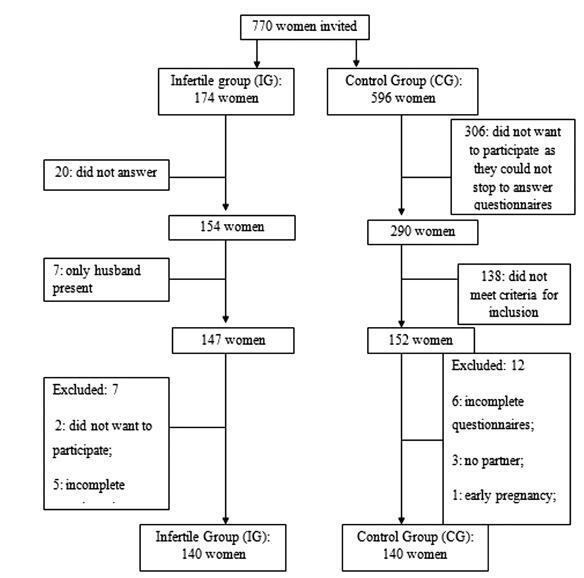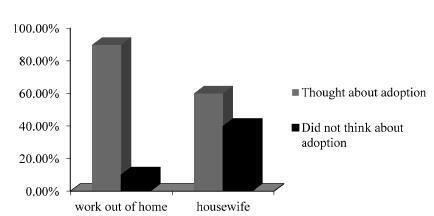-
Original Article12-01-2018
Sexual Function of Women with Infertility
Revista Brasileira de Ginecologia e Obstetrícia. 2018;40(12):771-778
Abstract
Original ArticleSexual Function of Women with Infertility
Revista Brasileira de Ginecologia e Obstetrícia. 2018;40(12):771-778
Views199Abstract
Objective
To assess the sexual function, anxiety, and depression of infertile women relative to a control group.
Methods
Infertile women (infertile group, IG) of reproductive age were invited to participate in this controlled study. A control group (CG) of women was recruited from the general population of the same city. Sexual function was assessed by the Female Sexual Function Index (FSFI), and anxiety and depression were measured by the Hospital Anxiety and Depression Scale (HADS).
Results
A total of 280 women participated in the present study, 140 in the IG and 140 in the CG. The analysis of the FSFI scores showed that 47 women (33.57%) in the IG and 49 women (35%) in the CG had sexual dysfunction (FSFI ≤ 26.55; p = 0.90). Women with anxiety or depression had a greater risk of sexual dysfunction, and sexual dysfunction increased the risk of anxiety and depression. Married women had a lower risk of depression than single women who were living with their partners.
Conclusion
Infertilewomenhadno increased riskof sexual dysfunction relativetocontrols. Anxiety and depression increased the risk of sexual dysfunction in the studied population.
Key-words AnxietyAssisted reproductionDepressionfemale sexual dysfunctionmarital infertilitySexualitySee more
-
Original Article06-01-2017
What do Infertile Women Think about Oocyte Reception, Oocyte Donation, and Child Adoption?
Revista Brasileira de Ginecologia e Obstetrícia. 2017;39(6):282-287
Abstract
Original ArticleWhat do Infertile Women Think about Oocyte Reception, Oocyte Donation, and Child Adoption?
Revista Brasileira de Ginecologia e Obstetrícia. 2017;39(6):282-287
Views139See moreAbstract
Purpose
The views of infertile couples regarding oocyte donation by third parties and adoption are unknown, as these may be interpreted as a final closure of the available options for conception. This study aimed to determine the acceptance of oocyte donation, oocyte reception, and child adoption of infertile women who submitted to assisted reproductive technology (ART) treatment
Methods
Sixty-nine women who were under treatment for infertility and submitted to ART procedures were included in this cross-sectional study. They were evaluated using semi-structured questionnaires administered during ovulation induction in a treatment cycle. Marital status, religion, years of schooling, occupation, type of infertility, age, duration of infertility, number of previous ART cycles, mean oocyte number per cycle, and mean number of embryos per cycle had no influence on a woman’s acceptance of oocyte donation or oocyte reception.
Results
More than 90% of the patients thought that the subject of “adoption” should be brought up during their ART treatments, although they preferred to discuss this topic with psychologists, not doctors. Women with occupations were more willing to consider adoption.
Conclusion
The opinions of these patients on these issues seem to be based on personal concepts and ethical, religious, and moral values. Women preferred to discuss adoption with psychologists rather than doctors.



